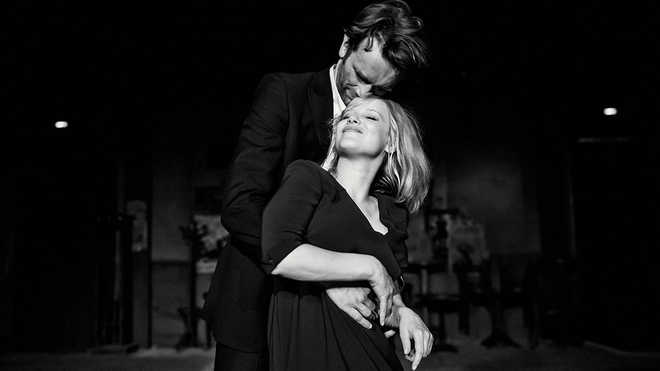A smoky-serene love story
Navnee Likhi
Polish director Pawel Pawlikowski’s finely crafted film Cold War is a love story of two persons from different backgrounds and temperaments. Set in post World War II Poland, East Berlin, Yugoslavia and Paris, the story revolves around the affair between Zula Lichon and Wiktor Warski, played by Joanna Kulig and Tomasz Kot, respectively. The story is loosely based on the lives of Pawlikowski’s parents.
In this bittersweet romantic film, Wiktor and Zula can’t stay away for long from each other, and yet sometimes, can’t stand each other. The film tracks the tumultuous relationship between Wiktor, a pianist, and Zula, a dancer-singer. The film has been shot in square format in black and white.
The movie opens in 1949 when Wiktor is shown driving around war-ravaged Poland, along with his colleague Irena. Wiktor is urbane, educated and an accomplished pianist, and is a music conductor in a folk music academy. He is auditioning young people from the countryside to train them for a song and dance performance to restore the pride of the war-ruined country and also showcase life and art of simple country folks. Many young people show up for auditions. During these auditions, Wiktor meets Zula. Zula is among the participants who had come to take part in the show, Mazurek Ensemble. Zula’s singing is not perfect but she has a stage presence.
Meanwhile Wiktor’s colleagues dig up suspicious information about her past — that Zula was not a country girl and was on probation after conviction for killing her stepfather. To this, Zula responds with a straight face, “He mistook me for my mother, so I showed him the difference with a knife”.
Wiktor is taken aback. However, he falls for Zula’s charm. It is music that brings the two together and also divides them for variety of reasons.
Soon Wiktor decides to stage chorus of the first show with Zula as a star performer. The troupe sings a glorious ode to Stalin. The rulers are pleased with the show and encourage Irena and Wiktor to compose few more songs on agricultural reforms. The troupe is asked to travel to Moscow and East Berlin to perform. Wiktor plans his escape with Zula but she doesn’t show up at their planned rendezvous and Wiktor walks across the border to West Berlin. Few years of them living apart, Zula continues with her singing but Wiktor faces hardships. Meanwhile, Wiktor flees to Paris to escape the tightening grip of communism, which has turned their popular Polish folk music into Soviet propaganda machine.
Although they are living apart, Zula and Wiktor never stop longing for each other. The narrative of the film picks up whenever they meet. Their meetings aren’t very cordial, rather edgy. The music is packed with melodious Polish folk songs, sung by peasants in rural post-War Poland. It is complimented by Zula’s and Wiktor’s dance moves. Wiktor is later seen working as a musician and composer in Paris. Zula arrives in Paris to perform but finds herself not at ease with the French genre of music, their style of singing and language. Wiktor and Zula meet and make a record of songs at the same place and time. Zula tries to sing in French Jazz style but is not comfortable with it and she scoffs at the lyrics which are given to her to sing by Wiktor’s poet girlfriend. Zula does everything in controlled fury. Zula’s and Wiktor’s taste in music are different. Wiktor is an intellectual and passionate where as Zula is more volatile in her singing and dancing. She decides to leave Paris and travels to Yugoslavia. When Wiktor comes to know about this, he too travels to Yugoslavia to see her perform. At the concert, Zula spots Wiktor among the audience and smiles at him. He is forcefully deported back to Paris. Wiktor and Zula happen to meet each other in Poland. But soon their relationship turns sour due to unrealistic expectations, poverty, ageing and Zula’s alcohol addiction.
The film depicts how people’s choices are affected by ideologies of the places they come from. The pace of the story remains tight, besides maintaining the mood and tone of the era. The monochromatic cinematography and mid-century period created by Lukasz Zal under the communist rule lend proper ambience to the story. Joanna Kulig’s performance as Zula and Tomasz Kot as Wiktor are engaging.
Unlock Exclusive Insights with The Tribune Premium
Take your experience further with Premium access.
Thought-provoking Opinions, Expert Analysis, In-depth Insights and other Member Only Benefits
Already a Member? Sign In Now










